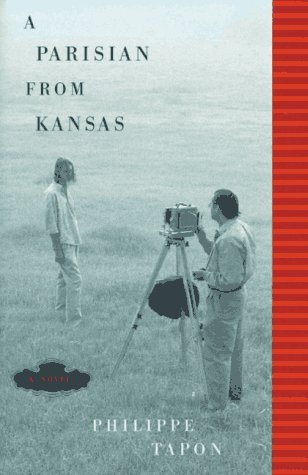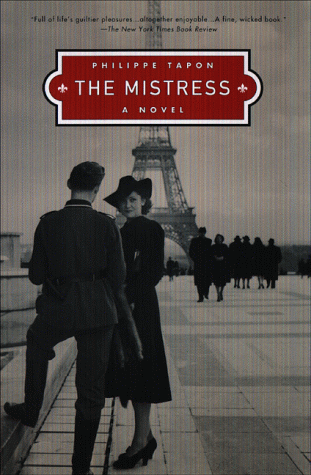My brother, Philippe Tapon, wrote two books. His second book, The Mistress, had a good review in the New York Times. However, I loved his first book, A Parisian From Kansas, much more. It's one of my favorite books of all time! Really. Here's why...
A Parisian From Kansas
Instead of reviewing it in a traditional way, I will give you my unique perspective into my brother's novel and tell you stories you wouldn't otherwise hear about the making of the novel.
Background of A Parisian From Kansas
 My brother sent three chapters of the book to a famous semi-retired editor, William Abrahams. After reading the 3 chapters, Mr. Abrahams asked for the rest of the book. Although he had vowed to never edit someone's first attempt at a book (and kept that vow for over 40 years), he decided to break it for Philippe's novel. Moreover, he decided to come out of his semi-retired state to edit it. Obviously, this book must have been extremely compelling to make such a famous editor take such a significant action.
My brother sent three chapters of the book to a famous semi-retired editor, William Abrahams. After reading the 3 chapters, Mr. Abrahams asked for the rest of the book. Although he had vowed to never edit someone's first attempt at a book (and kept that vow for over 40 years), he decided to break it for Philippe's novel. Moreover, he decided to come out of his semi-retired state to edit it. Obviously, this book must have been extremely compelling to make such a famous editor take such a significant action.
Mr. Abrahams did it, "Because I've never read anything like this." In fact, that's what most people say after reading it, and I can almost guarantee that you will too. I cannot promise that you'll love it (though nearly everyone has), but I can promise you that you'll agree that it is extremely original.
Allusions to great works
Throughout the work, the author makes allusions to great works such as T.S. Eliot's Waste Land, Fitzgerald's Great Gatsby, and Irving's The World According To Garp. It is a self-referential novel so it makes reading it exciting. Even though the work is considered fiction, about 80% of the novel events actually occurred; so one can certainly say that it is based on a true story.
Look for "Ghosts" in the novel
I'll share with you a secret you would probably never pick up unless you knew the author. If you pay close attention you will notice that in a few places Philippe mentions some fairly nondescript characters in the novel.
For example, near the end of Chapter 2 Philippe and Darren say goodbye to the tarot card reader. Then he writes:
There was a tall English-looking gentleman wearing pin-stripes and glasses behind the door, resting on a furled umbrella, waiting.
"Bonjour, madame," he said, with an execrable accent.
She acknowledged him with a smile.
Darren said good-bye; so did I. She stepped back; the gentleman looked at me with a backward half-look, and then she closed the door on them both.
After reading the above passage most readers, will either think, "Huh?" or just ignore it and move on. After all, it's strange that Philippe takes the time to describe this seemingly unimportant gentleman "character" in the novel.
Here's the secret: The preceding passage describes the tarot card reader drawing all sorts of cards and predicting the future. If you're familiar with T.S. Eliot's Waste Land, you'll see the allusion to the third stanza of the epic poem:
Madame Sosostris, famous clairvoyant,
Had a bad cold, nevertheless
Is known to be the wisest woman in Europe,
With a wicked pack of cards....
Thank you....
So who is that English-looking gentleman? T.S. Eliot himself! Indeed, Philippe sneaks Eliot into the novel in deference to Elliot's great work which Philippe alludes to. The idea is that T.S. Eliot is a "ghost" in the novel who is overlooking the allusion Philippe makes to the Waste Land.
There are a few other "ghosts" in the novel if you keep your eye out for them. The idea of putting "ghosts" in the novel comes from Alfred Hitchcock's movies, where, if your eye wanders to the "wrong part of the screen" you might catch a glimpse of Hitchcock himself.
In short, what makes the book so fascinating is that it is simple enough to be read casually and enjoy on a superficial level, and yet it is complex enough to be analyzed in a graduate school level English literature class.
Architecture of novel
The novel has a distinct "architecture" that borrows from the immortal Odyssey of Homer. For example, in Homer's masterpiece, Ulysses describes his voyage to "hell" in Book 9. By Book 11 he recounts the deepest depths of the underworld. By Book 13, Ulysses snaps out of his flashback.
Similarly, Philippe writes what he calls the Fragment Chapters (numbers 9-12) in his novel. Starting in Chapter 9 the writing style changes dramatically, as Darren, the protagonist, begins to narrate. Philippe transcribes the thoughts that Darren has recorded on a tape. Chapters 9 through 12 delve into Darren's life from his perspective. Because of the different style, these chapters truly feel like a "departure" from the book.
And just as Ulysses graphically describes the horrors of Hades and the underworld in Book 11 of the Odyssey, Darren graphically depicts the homosexual acts he committed during his brash youth in the gay underworld in Chapter 11. The revolting description reaches a crescendo by the end of Chapter 11 and one breaths a sigh of relief as the author eventually reverts to the novel's original style and story.
If you are sensitive to such writings, I suggest you skip the Fragment Chapters (9-12), especially Chapter 11. However, although the descriptions are graphic, they are not gratuitous - they stem from the deep architectural design of the novel.
Another interesting detail to look for is to notice how the novel turns on itself in Chapter 13. It's as if the novel ends in that chapter and begins anew. If you look closely you will see a parallel between Chapter 13 and Chapter 1. And it continues: Chapter 14 parallels Chapter 2, Chapter 15 follows 3, and so on (although the parallelism soon drops off).
I caught this parallel structure on my own (somewhat by accident), and I asked my brother if he had done it on purpose. He had. He was happy that I caught it.
Little nuggets
Sometimes the author will just throw in a micro-allusions that, if you're in the know or you're paying attention, you'll appreciate and smile.
For example, if you piece together the "ending" of James Joyce's Finnegans Wake wth its "beginning," you would get:
A long a last a loved along the riverrun past Eve and Adam from swerve of shore to bend of bay...
So what, you say? Well, if you're aware of the above you'll smile when you casually read this passage on page 11 of A Parisian From Kansas:
The next night, the three of us took a corner table at Finnegans Wake, a pub not far from where the river ran, and....
The subtle allusion of "Finnegans Wake" and the "river ran" is clever. The novel is littered with such micro-allusions. It's no big deal if you miss them, but when you catch them you may smile.
Here's one more on page 3:
[Jean-Baptiste had] found a wicker bookcase and had laden with all his unread books; among them I spotted Sur La Route and Le Soleil Se Leve Aussi.
If you know French (or ask someone who does) you would know that those two books are (translated) On the Road (Jack Kerouac) and The Sun Also Rises (Ernest Hemingway). Again, it's just a micro-allusion to credit the works that inspired Philippe to write.
Conclusion
Don't worry that this novel is a bunch of intellectual mumbo-jumbo. While the novel is intense, it is not heavy. The writing style flows smoothly and is frequently light and colloquial.
In short, A Parisian From Kansas is truly an amazing work. To think that the author wrote it in just 9 months while working in Paris part-time is flabbergasting.
Buy it for pennies on Amazon!
What reviewers say about A Parisian From Kansas
- "...Tapon is a real writer of great talent..." - Clarence Brown in The American Reporter review of A Parisian From Kansas
- "But it not just an AIDS novel. A Parisian From Kansas positively teems with literary references questioning, exploring, confronting, philosophical, literary, and metaphysical ideas, with humor, intelligence and grace. That's what I think about Tapon's remarkably original debut novel.... Tapon's audacious and wholly successful book.... The year is early (this is April 6, as I write), but I'll venture to say this will be one of my top 10 books for the year original, sad, surreal - it's and smart." - Richard Labonte Reviewer for A Different Light Bookstore
- Publishers Weekly has selected Philippe Tapon as one of 15 most noteworthy first-time novelists in the United States, describing it as "an adventurous investigation of the creative process, a multilayered exploration of gay identity and an unnerving analysis of society's response to the AIDS crisis."
- "A clever and almost consistently amusing debut, part Nabokov and part John Irving..." - Kirkus
- "...Tapon's prose is almost faultlessly clear and witty, with plenty of sharp dialog, loving, acute descriptions of Paris, and an unflagging sense of movement. It's not surprising to find the text littered with references to F. Scott Fitzgerald and John Irving, two of the better melodists in American writing." - Review by Paul Reidinger, an author
- "[A Parisian From Kansas is] screamingly funny at times and at others just screaming." - American Reporter
- "Despite the ease with which the term tour de force can be tossed around, in tossing it in the direction of this remarkable first novel, it sticks!!.... Alternately funny, flip, and deadly serious, this novel boasts fully human, foible-laden characters, and it is brilliant with technical virtuosity." - Brad Hooper, Reviewer for the Booklist
- "Not for the first time, I felt that the novel had pulled me into her orbit." - American Reporter Review
- Booklist and Kirkus, two respected reviewers, gave the novel a prestigious star (reserved for the best books). Furthermore, the novel is in the list of Fiction Stars of 1997.
- "Unconventional, uncompromising, and unblinkingly truthful, A Parisian from Kansas is an emotion-packed exploration of the limits of compassion and the ills of a generation. A first-rate, page-turning narrative, a dramatization of the creative process and the inherent challenges of novel writing, this story is provocative in the very best way." - Penguin
- "This is one of the most original works of gay fiction in years." - Amazon.com
- Baker & Taylor put the novel in its Upcoming Books to Buy list. Moreover, Amazon.com put it on its Recommended list.
- "Tapon is a writer whose verbal gift doesn't desert him even when he is lost." - The Guardian
- "Tapon is relentlessly literary..." says Clarence Brown, a book reviewer.
- The author's editor, William Abrahams (who recently died), told Philippe after reading the book: "Philippe, you are a better writer than John Irving, and you have nothing to envy from Fitzgerald." Heavy compliments indeed coming from such a renowned editor was 77 years old when he said this.
- "An assured and entertaining debut that will make readers curious to see what its talented author will turn his hand to next." - Kirkus
- A Parisian from Kansas is a quixotic, erotic, and thoroughly spellbinding work about expatriate life in Paris, about a writer creating a novel, and about a raw-boned, HIV-positive American named Darren Swenson who wants to be made immortal in the book he asks Philippe Tapon to write. Shockingly graphic, yet delicately structured, A Parisian from Kansas folds back in upon itself as Darren visits his farmer parents in Kansas, meets lovers, and dies several times as the action accelerates toward a tragic but life-affirming finale. With Paris as a backdrop and an all-pervasive presence, Philippe Tapon, both character and author, writes about heiresses, intellectuals, the devil himself, and jeunesse doree, as he follows the witty, iconoclastic Darren's last days of life. A Boswell to this Johnson from Kansas, he is scribbling madly all the while. The result is alternatively phantasmagoric, hallucinatory, and journalistic - an eyewitness account of a man's dying and a novel's being born.
Official synopsis of A Parisian From Kansas
Remarkably assured, accomplished, and spellbinding, this engaging story-within-a-story tells of the friendship between two Americans in Paris: the disaffected, world-weary HIV-positive Darren; and Philippe, the sensitive, poetic young man who agrees to write Darren's novel.
From the book jacket
In a debut by one of the most original writers in recent fiction, Philippe Tapon creates a provocative Mobius strip novel. A Parisian from Kansas is a quixotic, erotic, and thoroughly spellbinding work about expatriate life in Paris, about a writer creating a novel, and about a raw-boned, HIV-positive American named Darren Swenson who wants to be made immortal in the book he asks Philippe Tapon to write.
Shockingly graphic, yet delicately structured, A Parisian from Kansas folds back in upon itself as Darren visits his farmer parents in Kansas, meets lovers, and dies several times as the action accelerates toward a tragic but life-affirming finale. With Paris as a backdrop and an all-pervasive presence, Philippe Tapon, both character and author, writes about heiresses, intellectuals, the devil himself, and jeunesse doree, as he follows the witty, iconoclastic Darren's last days of life. A Boswell to this Johnson from Kansas, he is scribbling madly all the while. The result is alternatively phantasmagoric, hallucinatory, and journalistic--an eyewitness account of a man's dying and a novel's being born.
Autobiography as fiction...an homage to The World According to Garp and The Waste Land recast in the shadow of AIDS...a story within a story--Philippe Tapon's work is all this and more. What it is above all is emotionally powerful literature by a distinctly American voice.
Philippe Tapon is a 30-something native Californian who has lived in Paris, Madrid, and London.
Excerpt
"That was the night I had really started imaging Darren: not only imagining his nice shoes and wry smile and cafe-chic clothing, but imagining also just how his lifelong collections of photographs, journals, tape recordings, cafe-chic clothing and his vast accumulations of stories could have all been yoked to his immense ambition--to turn the raw material of his life into a novel.
"We had sensed that ambition in each other, and that ambition lashed us together. He had the material, I had the style--and together, we had a novel."
The Mistress by Philippe Tapon
Philippe's second and final novel is The Mistress. It follows a troubled family through WWII. It's loosely based on our real French family.
I liked A Parisian more than The Mistress. However, if A Parisian sounds too crazy for you, you may prefer The Mistress because it is more conventional. Also, The Mistress is loosely based on our French side of the family. My brother didn't even change the names of my grandparents, my dad, and his sister. Like A Parisian From Kansas, The Mistress is mostly true, although unless you know Philippe, it's hard to know when he makes stuff up.
The New York Times gave The Mistress a great review.
Buy The Mistress for a few pennies on Amazon! See the right sidebar on this page for the direct links to both books!




